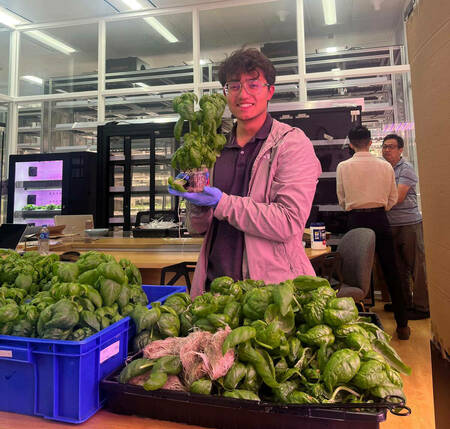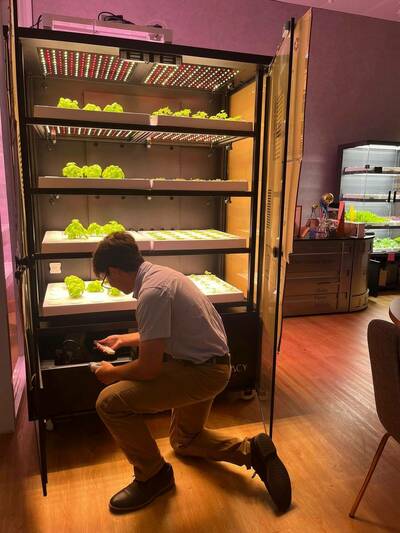When Johan Rengifo ’26 arrived in Hong Kong for his summer internship, he wasn’t sure what to expect. After all, this wasn’t part of the plan. He had hoped to participate in the Japan Summer Engineering program, but as it was more designed for mechanical and aerospace engineering students, and he was an electrical engineering student, it wasn’t a fit. After talking with some professors about this dilemma, a new opportunity arose: the chance to do an internship in Hong Kong.

Rengifo would be the first student of the engineering Hong Kong program, an endeavor championed by Professor Bill Goodwine. Goodwine first established a program for engineering students in mainland China 10 years ago. “It was an exchange program and the key feature that’s always been part of the experience is that it’s project-based,” Goodwine shares. “There’s a couple benefits to the students — I think the way to put it succinctly is that they’re engaging with their international peers within the engineering context.” Unfortunately, when the world shut down due to the pandemic, many international programs, including this one, came to a halt.
But in recent years, Notre Dame Hong Kong director, and long-time associate of Goodwine, Catherine Leung has been encouraging a return of the program. Rengifo’s situation appeared to be the perfect opportunity. This time around, Goodwine chose Hong Kong as a destination, thinking it’d be a popular place for students to visit. Through a connection with a previous student of his, he was able to set up a summer internship for Rengifo — initiating the new start to an engineering program in China. Leung offered to sort out administrative details like housing for Rengifo, and in order to experience the cultural immersion aspect of his time in Hong Kong, Rengifo joined the Global Professional Experience (GPE) program, as well, taking a one-credit course under Professor Jonathan Noble.
"Hong Kong is a very unique and special place," says Rengifo. "There’s always innovation happening.”
Through the GPE program, Rengifo got to start off his time in Hong Kong exploring the local culture and visiting the work sites of other Notre Dame students. When asked about the atmosphere of the city, Rengifo admits — “It was intense.” However, being from New York, the busy metropolis wasn’t entirely unfamiliar. “It’s the same urban type of environment, very hustle and bustle, packed with people. So the transition wasn’t too rough,” he shares. “You have a lot of diversity of different cultures.”
After a week of this orientation, he started his six-week internship at Farmacy, a farming technology firm that creates smart mobile farms in urban cities. “The most exciting part was getting to work on something that I was interested in, which was sustainability within agriculture,” Rengifo says. He also had a lot of freedom as an intern for Farmacy, which he shares, came with its own difficulties — such as making decisions on your own and questioning which step to take next in a project.
Ultimately though, he appreciated the opportunities that came with it: “It gives you a lot of liberty and creativity to be able to forge your own methodology.” Throughout his internship, he relied on the guidance of supervisors at Farmacy and also had regular check-ins with Goodwine, who would offer feedback and help Rengifo navigate some of the challenges of his work.
His primary contribution was a project focused on growing basil in Farmacy’s smart mobile farms. He conducted research and literature reviews, designed and implemented experiments, prepared reports, and analyzed the data — all while collaborating with international team members. “There’s a real-world reality and dimension to it,” Goodwine notes, sharing how the company project-based nature of this program (and others like it) makes it especially impactful.

“The project that I was working on was optimizing light intensity for hydroponic basil growth,” Rengifo shares. “I created my own experimental design, as well as the mathematical foundation for why I picked certain light intensities and how I was able to get those on the mobile farm system — which is what we used to plant all of the seeds and have them grow.”
As a result of his time in Hong Kong, Rengifo shares that he’s grown in his cross-cultural communication and gained valuable experience integrating diverse perspectives into problem-solving. Because Hong Kong is a hub for tech innovation — “more than Japan, even,” Rengifo would now argue — the city was central to the outcome and impact of his experience. He also notes that the friendships he made were a highlight of his time: “I truly did meet some incredible people who I still keep in touch with and I’m hopeful that our paths may cross again someday in the future."
So given the option, would he choose it again? “Now having gone through it, I would have definitely picked Hong Kong. Hong Kong is a very unique and special place,” says Rengifo. “There’s always innovation happening.”
Goodwine hopes to see the program grow in coming years. “It’d be nice if this could become a partnership also with a university, like Hong Kong University of Science and Technology, and they could send some students to Notre Dame — to make it more of an exchange program.”
For other students looking for similar opportunities, Rengifo shares valuable advice: “[Don’t] be afraid to go out and seek opportunities, often you’ll find them in places where you least expect them. That certainly happened with me.” As Rengifo learned, sometimes your second choice is the best choice.
To learn more about Notre Dame Hong Kong and the programs it offers, visit hongkong.nd.edu.
Originally published by at hongkong.nd.edu on August 06, 2024.